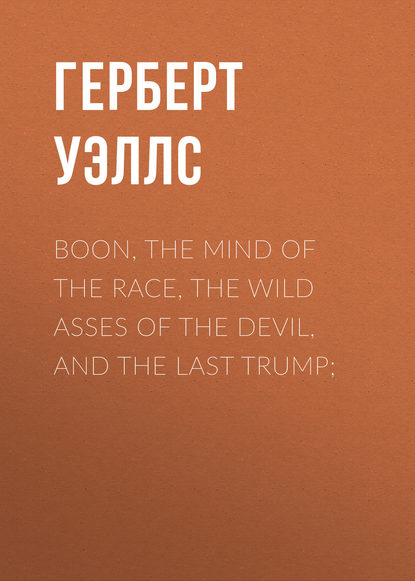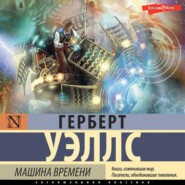По всем вопросам обращайтесь на: info@litportal.ru
(©) 2003-2024.
✖
Boon, The Mind of the Race, The Wild Asses of the Devil, and The Last Trump;
Настройки чтения
Размер шрифта
Высота строк
Поля
Unhappily Mr. Parchester did not go home. He went out from the Bishop’s residence stunned and amazed, and suddenly upon his desolation came the thought of Mrs. Munbridge…
She would understand…
He was shown up to her own little sitting-room. She had already gone up to her room to dress, but when she heard that he had called, and wanted very greatly to see her, she slipped on a loose, beautiful tea-gown négligé thing, and hurried to him. He tried to tell her everything, but she only kept saying “There! there!” She was sure he wanted a cup of tea, he looked so pale and exhausted. She rang to have the tea equipage brought back; she put the dear saint in an arm-chair by the fire; she put cushions about him, and ministered to him. And when she began partially to comprehend what he had experienced, she suddenly realized that she too had experienced it. That vision had been a brain-wave between their two linked and sympathetic brains. And that thought glowed in her as she brewed his tea with her own hands. He had been weeping! How tenderly he felt all these things! He was more sensitive than a woman. What madness to have expected understanding from the Bishop! But that was just like his unworldliness. He was not fit to take care of himself. A wave of tenderness carried her away. “Here is your tea!” she said, bending over him, and fully conscious of her fragrant warmth and sweetness, and suddenly, she could never afterwards explain why she was so, she was moved to kiss him on his brow…
How indescribable is the comfort of a true-hearted womanly friend! The safety of it! The consolation!..
About half-past seven that evening Mr. Parchester returned to his own home, and Brompton admitted him. Brompton was relieved to find his employer looking quite restored and ordinary again. “Brompton,” said Mr. Parchester, “I will not have the usual dinner to-night. Just a single mutton cutlet and one of those quarter-bottles of Perrier Jouet on a tray in my study. I shall have to finish my sermon to-night.”
(And he had promised Mrs. Munbridge he would preach that sermon specially for her.)
§ 13
And as it was with Mr. Parchester and Brompton and Mrs. Munbridge, and the taxi-driver and the policeman and the little old lady and the automobile mechanics and Mr. Parchester’s secretary and the Bishop, so it was with all the rest of the world. If a thing is sufficiently strange and great no one will perceive it. Men will go on in their own ways though one rose from the dead to tell them that the Kingdom of Heaven was at hand, though the Kingdom itself and all its glory became visible, blinding their eyes. They and their ways are one. Men will go on in their ways as rabbits will go on feeding in their hutches within a hundred yards of a battery of artillery. For rabbits are rabbits, and made to eat and breed, and men are human beings and creatures of habit and custom and prejudice; and what has made them, what will judge them, what will destroy them – they may turn their eyes to it at times as the rabbits will glance at the concussion of the guns, but it will never draw them away from eating their lettuce and sniffing after their does…
§ 14
There was something of invalid peevishness even in the handwriting of Boon’s last story, the Story of the Last Trump.
Of course, I see exactly what Boon is driving at in this fragment.
The distresses of the war had for a time broken down his faith in the Mind of the Race, and so he mocked at the idea that under any sort of threat or warning whatever men’s minds can move out of the grooves in which they run. And yet in happier moods that was his own idea, and my belief in it came from him. That he should, in his illness, fall away from that saving confidence which he could give to me, and that he should die before his courage returned, seems just a part of the inexplicable tragedy of life. Because clearly this end of the Story of the Last Trump is forced and false, is unjust to life. I know how feebly we apprehend things, I know how we forget, but because we forget it does not follow that we never remember, because we fail to apprehend perfectly it does not follow that we have no understanding. And so I feel that the true course of the Story of the Last Trump should have been far larger and much more wonderful and subtle than Boon made it. That instant vision of God would not have been dismissed altogether. People might have gone on, as Boon tells us they went on, but they would have been haunted nevertheless by a new sense of deep, tremendous things…
Cynicism is humour in ill-health. It would have been far more difficult to tell the story of how a multitude of commonplace people were changed by a half-dubious perception that God was indeed close at hand to them, a perception that they would sometimes struggle with and deny, sometimes realize overwhelmingly; it would have been a beautiful, pitiful, wonderful story, and it may be if Boon had lived he would have written it. He could have written it. But he was too ill for that much of writing, and the tired pencil turned to the easier course…
I can’t believe after all I know of him, and particularly after the intimate talk I have repeated, that he would have remained in this mood. He would, I am certain, have altered the Story of the Last Trump. He must have done so.
And so, too, about this war, this dreadful outbreak of brutish violence which has darkened all our lives, I do not think he would have remained despairful. As his health mended, as the braveries of spring drew near, he would have risen again to the assurance he gave me that the Mind is immortal and invincible.
Of course there is no denying the evil, the black evils of this war; many of us are impoverished and ruined, many of us are wounded, almost all of us have lost friends and suffered indirectly in a hundred ways. And all that is going on yet. The black stream of consequence will flow for centuries. But all this multitudinous individual unhappiness is still compatible with a great progressive movement in the general mind. Being wounded and impoverished, being hurt and seeing things destroyed, is as much living and learning as anything else in the world. The tremendous present disaster of Europe may not be, after all, a disaster for mankind. Horrible possibilities have to be realized, and they can be realized only by experience; complacencies, fatuities have to be destroyed; we have to learn and relearn what Boon once called “the bitter need for honesty.” We must see these things from the standpoint of the Race Life, whose days are hundreds of years…
Nevertheless, such belief cannot alter for me the fact that Boon is dead and our little circle is scattered. I feel that no personal comfort nor any further happiness of the mind remains in store for me. My duties as his literary executor still give me access to the dear old house and the garden of our security, and, in spite of a considerable coolness between myself and Mrs. Boon – who would willingly have all this material destroyed and his reputation rest upon his better-known works – I make my duty my excuse to go there nearly every day and think. I am really in doubt about many matters. I cannot determine, for example, whether it may not be possible to make another volume from the fragments still remaining over after this one. There are great quantities of sketches, several long pieces of Vers Libre, the story of “Jane in Heaven,” the draft of a novel. And so I go there and take out the papers and fall into fits of thinking. I turn the untidy pages and think about Boon and of all the stream of nonsense and fancy that was so much more serious to him and to me than the serious business of life. I go there, I know, very much as a cat hangs about its home after its people have departed – that is to say, a little incredulously and with the gleam of a reasonless hope…
There must, I suppose, come a limit to these visitations, and I shall have to go about my own business. I can see in Mrs. Boon’s eye that she will presently demand conclusive decisions. In a world that has grown suddenly chilly and lonely I know I must go on with my work under difficult and novel conditions (and now well into the routines of middle age) as if there were no such things as loss and disappointment. I am, I learned long ago, an uncreative, unimportant man. And yet, I suppose, I do something; I count; it is better that I should help than not in the great task of literature, the great task of becoming the thought and the expressed intention of the race, the task of taming violence, organizing the aimless, destroying error, the task of waylaying the Wild Asses of the Devil and sending them back to Hell. It does not matter how individually feeble we writers and disseminators are; we have to hunt the Wild Asses. As the feeblest puppy has to bark at cats and burglars. And we have to do it because we know, in spite of the darkness, the wickedness, the haste and hate, we know in our hearts, though no momentary trumpeting has shown it to us, that judgement is all about us and God stands close at hand.
Yes, we go on.
But I wish that George Boon were still in the world with me, and I wish that he could have written a different ending to the Story of the Last Trump.

















